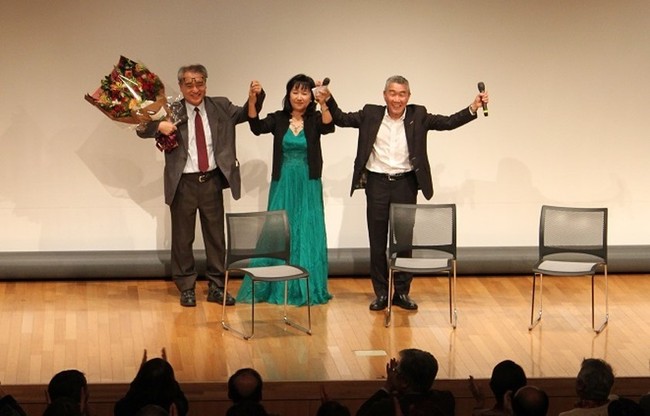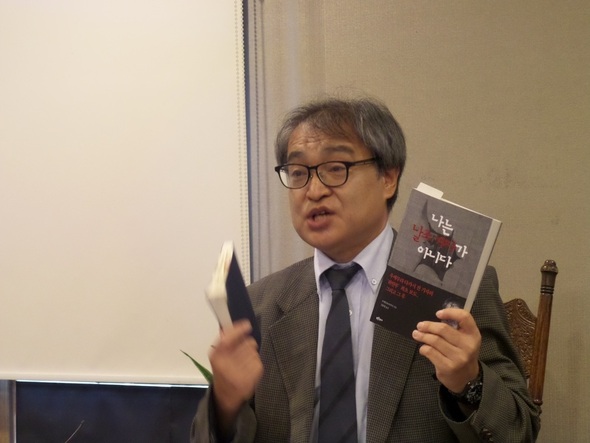 |
|
Former Asahi Shimbun reporter and current Catholic University of Korea guest professor Takashi Uemura (left), Zainichi Korean pianist Choi Seon-ae, and comedian Hiro Matsumoto acknowledge the crowd following their combination of lecture and concert at Seijo Hall in western Tokyo’s Setagaya ward on Jan. 6. (by Kang Myung-seok)
|
Takashi Uemura wrote the story of Kim Hak-soon, the first comfort woman to go public with her experiences
“The important thing isn’t anything about my article itself. It’s the fact that women were violated on the battleground.” The setting was Seijo Hall in western Tokyo’s Setagaya ward. It was Jan. 6, and the voice of former Asahi Shimbun reporter and current Catholic University of Korea guest professor Takashi Uemura, 59, was filled with vigor as he spoke on the topic of “Laughing at Conjecture and Playing Freedom” at a combination of lecture and concert in front of a packed house of 400 viewers. Uemura is famous as the journalist who first published an article in Aug. 1991 on the story of the latest Kim Hak-soon, the first person to speak publicly about her experiences as a Japanese military comfort woman. Since 2014, he has been involved in a painful battle with Japanese right-wingers. Threatening phone calls and letters began pouring in from conservatives four years ago after Japanese media claimed his article was “fabricated.” His daughter, then a high school student, was subjected to death threats. At the time, Uemura had been working for over two years as a lecturer at Hokusei Gakuen University. The reports resulted in him losing an appointment as a professor at Kobe Shoin Women’s University. Uemura is now involved in legal battles in Tokyo and Sapporo after filing suit for defamation against right-wing Japanese intellectuals accusing him of being a “fraudulent reporter.” Joining him for the performance on Jan. 6 were third-generation Zainichi Korean pianist Choi Seon-ae, who has become well-known for her campaigning against fingerprinting, and comedian Hiro Matsumoto, who has spent the past two decades performing one-man theater pieces titled “Constitution Army” to share the important of the Peace Constitution with the Japanese public. The participants were gathered early in the year to affirm their resistance to the rightward shift under the Shinzo Abe administration and to support Uemura’s legal battles, which have gone on for more than three years. While billed as a “talk concert,” the event included an eclectic range of genres. It began with a satirical play on current events by Matsumoto, who drew laughs from the audience early on delivering comical barbs about the Abe administration’s private education scandals with his trademark droll expressions. The highlight came with his “Constitution Army” bit, which has developed over the past 20 years. The style of communication was all Matsumoto’s own, presenting himself as a personification of the Constitution: “First name ‘Constitution,’ last name ‘of Japan.’” He finished by stressing the Constitution’s Preamble, which states, “Never again shall we be visited with the horrors of war through the action of government.” The second part was a piano recital by Choi, who performed a selection of four pieces including Chopin’s “Fantaisie-Impromptu in C Sharp Minor.” Chopin was an exile from Russian-ruled Poland who died in France. “Chopin sang the soul of Poland to the last. That was his way of resisting,” Choi wrote in her autobiography “My Father and Chopin,” revealing her particular attachment to the composer. Choi is the eldest daughter of the late Rev. Choi Chang-hwa (1929–1995), who dedicated his life to opposing fingerprinting of Zainichi Koreans and restoring their human rights. Choi Seon-ae herself fought a more than decade-long legal battle over objections to fingerprinting before finally winning permanent residency from the Ministry of Justice. After the performance, Choi recalled her younger experiences. “On days where there was a hearing, I would always get threatening phone call,” she said. “I want to help Mr. Uemura.”
 |
|
Takashi Uemura, the former Asahi Shimbun reporter who first brought the Japanese military comfort women issue to public debate in 1991 holding a copy of the Korean edition of his book, “Truth: I Am Not a Fake Reporter”
|







